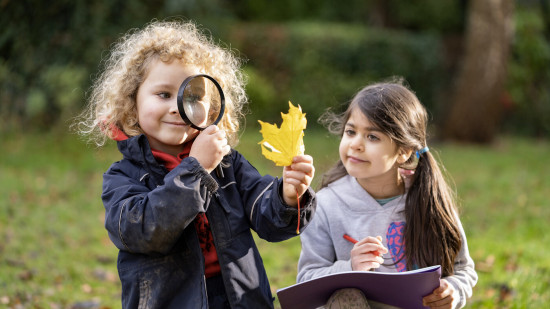Early Years to Upper School
There are four stages of education within a Waldorf School that correspond to different stages in child development.
Early Childhood age 3 - 6
Our approach to early years is a distinctive and fundamental feature of Waldorf education. It is designed to provide a home-like environment where children can feel secure and cared for. Children stay in their mixed-age kindergarten with the same teacher for three years. The older children take care of the younger ones and the younger children look up to and learn from the older children. Their day is structured, with a balance of adult- and child-led activities. In child-initiated play, children learn imaginatively and through exploration. Alongside the adults, they engage in meaningful, practical tasks like gardening, cooking and crafts. Children’s communication, language and pre-literacy skills are developed through daily singing, poetry and storytelling. Practical and natural maths learning is built into many aspects of the curriculum, from setting the table to measuring their woodwork projects. Good social habits and independence are instilled through a range of activities, including shared mealtimes, working together and the regular celebration of festivals. Children’s knowledge and understanding of the world grows through their experiences, both indoors and out. It is an ecosystem that nurtures and develops, providing a bridge from home to school and preparing children for the next stage of their learning.
Lower School age 6 - 11
In the academic year that children turn seven, they move into a single age group of peers, and begin a more formalised approach to learning with their new class teacher. It is at this stage that they start to learn to read and write in a more structured way. This later start to formal literacy, building on the secure foundations laid in the kindergarten, means that children are developmentally ready, and learn with ease and enthusiasm. Evidence shows that they reach comparable or higher levels of literacy to the national curriculum by age nine or ten at the latest. Much of the teaching is done in cross-curricular ‘blocks’, with subjects interwoven through learning themes. Through these years the child's cognitive and practical skills develop, supported by a range of teaching methodologies which include artistic and physical activities on a daily basis. Two languages are learnt, together with the recorder starting in Class 1 and a further instrument from Class 3. Specialist subject teachers teach languages, games, craft and music. The teacher usually stays with the class until age eleven or fourteen depending on the school. The relationship which grows between teacher, child and family deepens the understanding of the child.
Middle School age 11 - 14
In many schools the Class Teacher continues with the class into the Middle School years but in some the teacher may change. Children's cognitive and analytical skills are developing. School work becomes increasingly more academic although artistic activity continues alongside to ensure balanced learning. There is a focus on independent learning, research skills, media maturity and scientific discovery. Sports and more competitive games are introduced and drama is developed with children having the opportunity to write their own plays and put on productions. Most children will also play in the school orchestra.
Upper School age 15 - 18
When the children leave their Class Teacher at the end of Class 8, this marks a new phase in their development. The morning ‘main lesson’ is now also taught by a range of specialist teachers, although the young people have a Class Guardian to accompany their journey. The curriculum provides opportunities for students to engage with different and sometimes quite challenging perspectives and points of view. Continuing to build on their academic, physical, artistic and practical knowledge and skill, they engage in questioning, discussion and critical thinking. There is a continued focus on curriculum breadth, allowing students to retain their interest in a wide range of subject areas. Each young person is supported to become a well-qualified, well-rounded, culturally competent, capable, ethical and responsible adult, ready for the next stage of their education.
GCSEs, A Levels, BTECs, T Levels
Schools that extend to the 14 - 18 age group may offer a range of GCSEs, A Levels, BTECs and T Levels. Others may also or alternatively offer the qualifications listed below.
New Zealand Steiner Certificate
A number of schools offer the New Zealand Certificate in Steiner Education (NZCSE). Similar to the IB and recognised internationally, this 3 year programme prepares pupils for university, apprenticeships and work without taking exams. A relatively new programme to UK schools there are a growing number of pupils who have already gained entrance to a range of Russell Group and other universities. https://nzcse.co.uk
Crossfields Institute Level 2 Integrated Education Certificate.
This is a qualification is for 14-16 year olds and integrating an independent project and a Creative Thinking Skills module. for more information visit the Crossfields Institute

